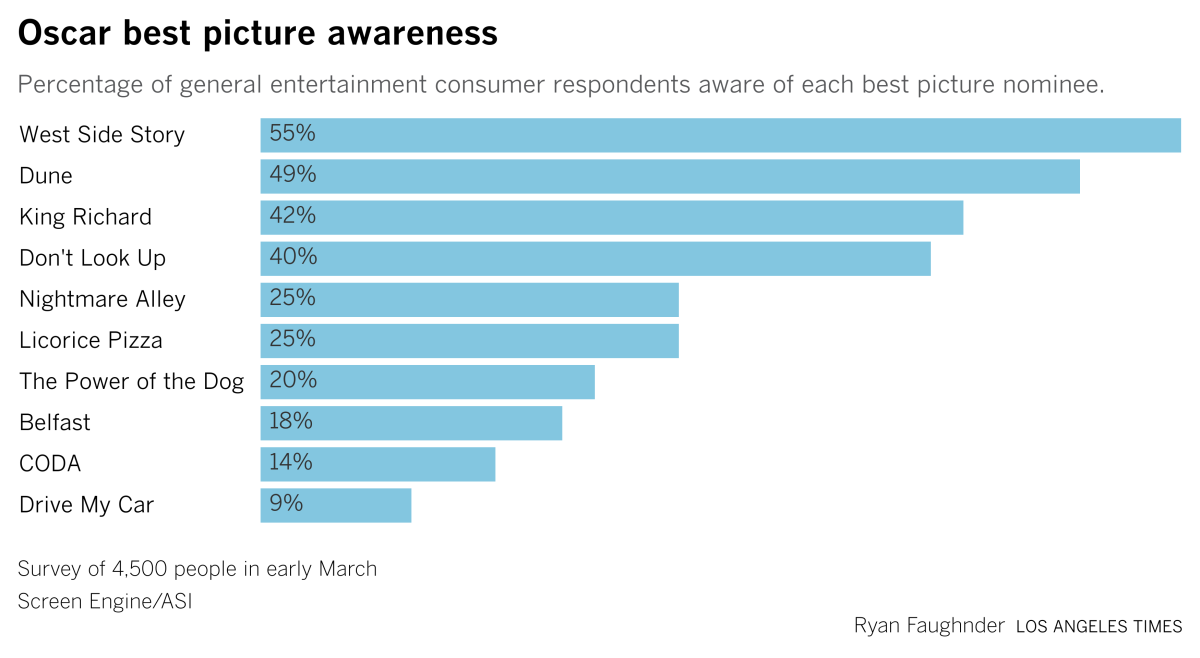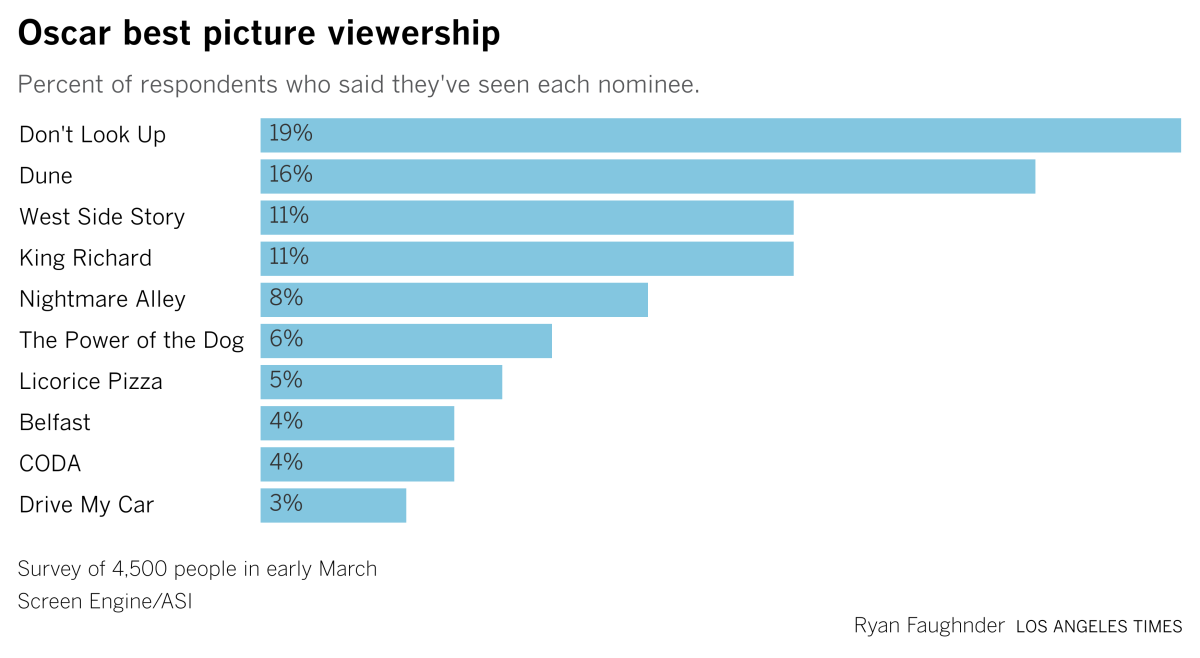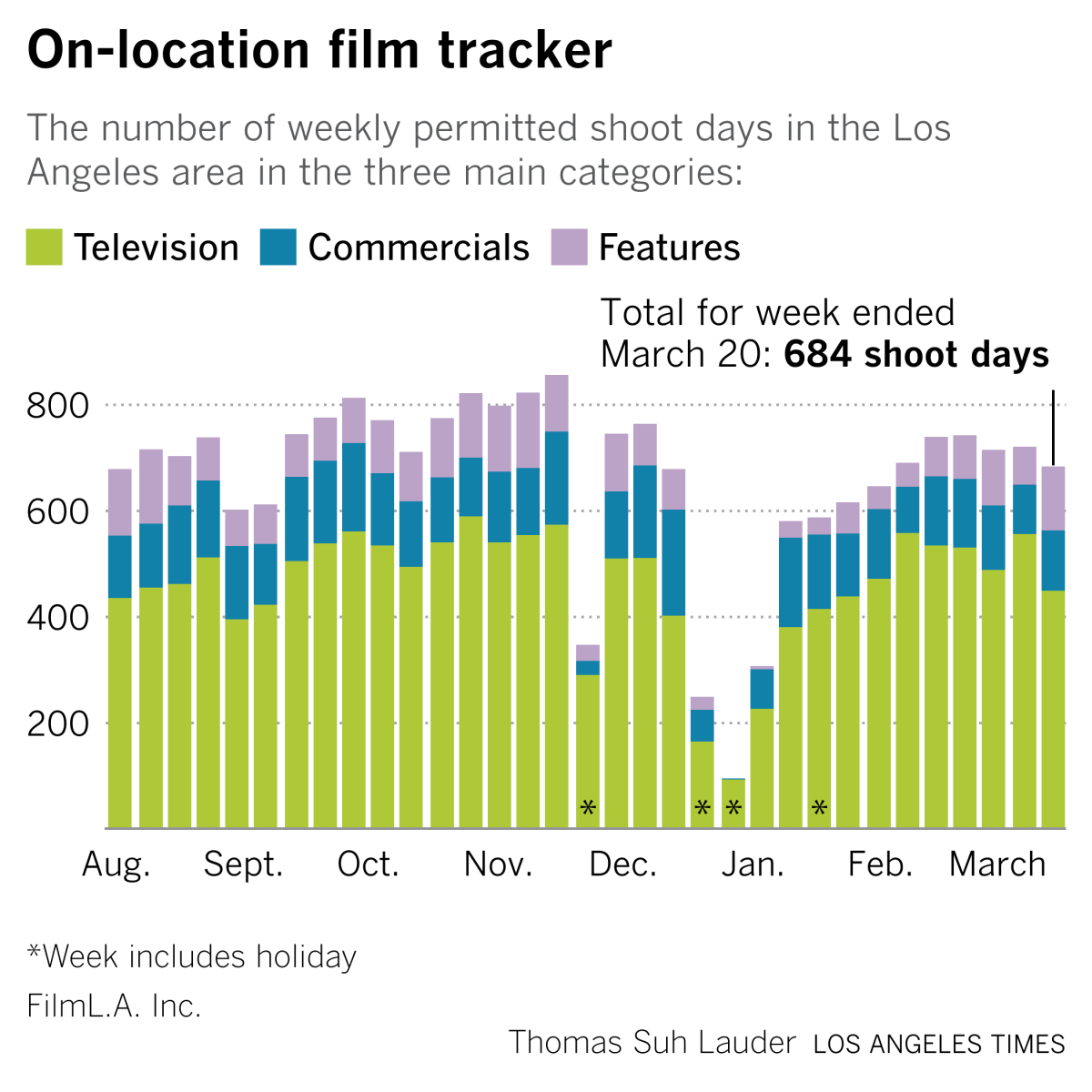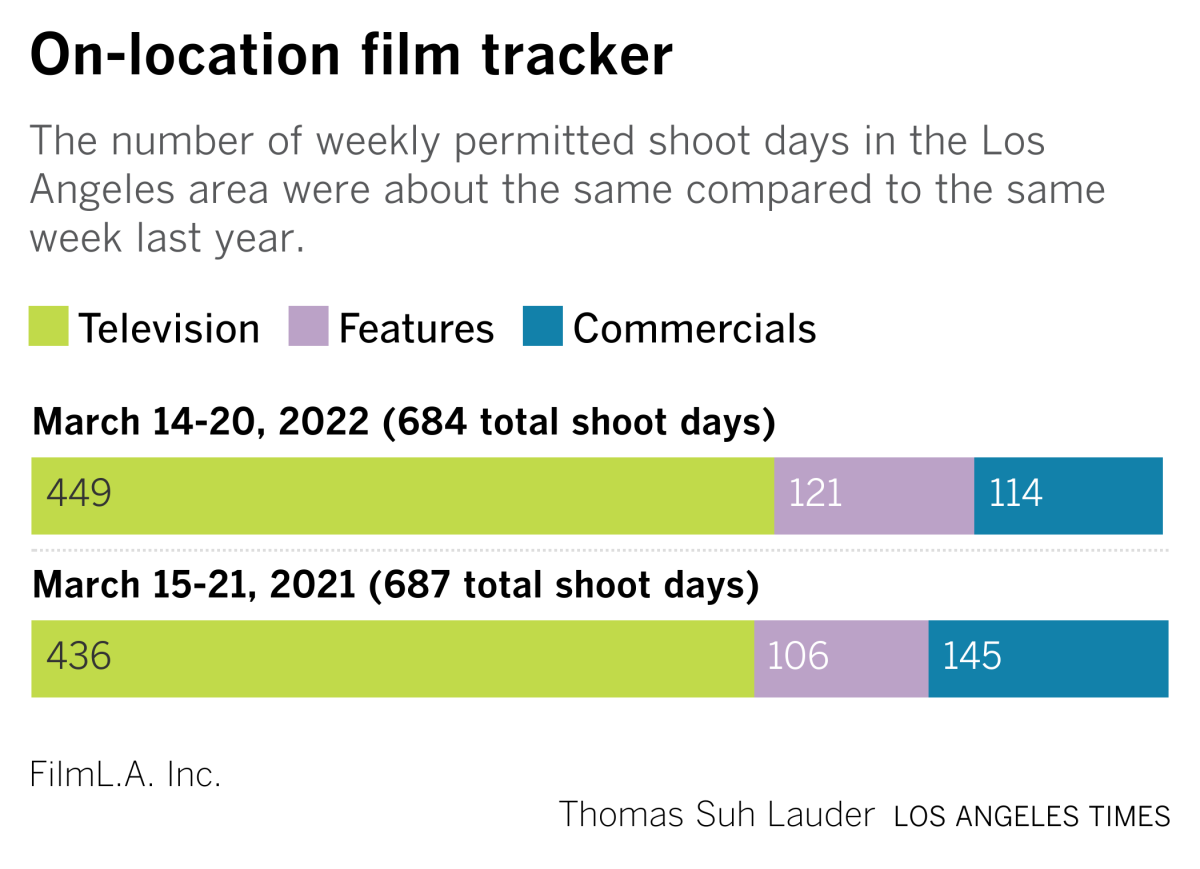The Oscar nominees aren’t ‘Spider-Man.’ But they aren’t the Indie Spirits either

This is the March 22, 2022, edition of the Wide Shot newsletter about the business of entertainment. If this was forwarded to you, sign up here to get it in your inbox.
If you’re reading this newsletter regularly, chances are you are conscious of the fact that something called the Oscars is happening on Sunday. You’ve probably heard of most of the best picture nominees.
But does the general viewer know what “The Power of the Dog” is? Have they heard of “Belfast?” Do they know where to watch “CODA”?
Prognosticators routinely blame the ongoing decline of the Oscars telecast ratings on the nominees’ lack of popularity. The sliding viewership, which hit a new low last year, is a big problem for ABC, which broadcasts the annual show, and its corporate parent Walt Disney Co.
A common source of frustration among people who grew up with the Academy Awards as a mainstream television event is an overriding sense that the voters increasingly gravitate toward obscure festival selections rather than movies with mainstream appeal. Like, say, “Spider-Man: No Way Home,” “No Time to Die” or even “House of Gucci.”
How accurate is that perception? Survey data provided exclusively to The Times by Screen Engine/ASI indicates that most consumers did not know the majority of the 2022 Oscar best picture nominees. For what it’s worth, though, this year’s crop of contenders had generally higher public awareness than the class of 2021, which was brutally hobbled by pandemic-related theater closures.


Screen Engine/ASI polled 4,500 general entertainment consumers ages 13 to 64 in early March to gauge whether they had heard of or seen the movies that are nominated in the best picture category.
Steven Spielberg’s remake of “West Side Story,” released by Walt Disney Co., had the highest overall awareness at 55%, according to the data firm. In second place was Denis Villeneuve’s “Dune,” which came in at 49%, followed by Will Smith starrer “King Richard” at 42% and Adam McKay’s “Don’t Look Up” at 40%.
Those numbers may not sound huge. But compare them to a similar survey of 1,435 consumers conducted a year ago about the 2021 nominees, when the highest awareness was for Warner Bros.’ “Judas and the Black Messiah,” at 36%. Basically, the Oscar best picture nominees don’t have a “Spider-Man” among them. They’re not quite the Film Independent Spirit Awards either.
The meager box office for “King Richard” (cannibalized by its same-day HBO Max release), “Nightmare Alley” and “West Side Story” contributes to the impression that this year’s nominees are small fry. The lack of reliable industrywide data on streaming viewership compounds the problem, though independent analysts like the Entertainment Strategy Guy have done an admirable job of compiling and interpreting numbers.
According to Screen Engine/ASI, actual viewership was highest for “Don’t Look Up,” which streamed on Netflix. About 19% of respondents reported having seen it, followed by 16% for “Dune” and 11% for both “West Side Story” and “King Richard.”

No doubt, this year’s lineup has its fair share of indie titles and critical darlings that the typical viewer may not recognize. Ryusuke Hamaguchi’s “Drive My Car,” a critically acclaimed three-hour Japanese film, had the lowest awareness at 9%. Among the frontrunners, Apple’s Sundance acquisition “CODA” clocked in at 14%, while Netflix’s “The Power of the Dog” had 20%.
With the much-needed expansion of the academy — now with a younger and more inclusive and international body of voters — it has become more likely that something like “Drive My Car” will be nominated among the 10 contenders for the top prize. One of the services the Oscars can provide is to promote high-quality movies that don’t have the commercial advantages of a studio franchise.
And it’s not as if everything on the list is some kind of Indie Spirit-friendly obscurity. My colleague Justin Chang penned a compelling essay about how the nominations have at least the makings of a broadly appealing slate, even if the box office doesn’t reflect that:
To lump these movies together under a giant frown emoji, in other words, would be as reductive as trying to consign them to a single style or subject. This year’s best picture race features a musical, a western, a sci-fi epic, a neo-noir, a youth comedy, a disaster flick, a sports movie, a personal memoir, a scrappy Sundance crowd-pleaser and a Cannes auteur’s magnum opus. Leaving aside the question of whether these films are any good (I think most of them are) — and the less interesting question of how much money they’ve made — it’s hard to recall the last cluster of films that so admirably fulfilled the best picture ideal. There’s something here, in theory, for everyone — except those who subsist on an exclusive cinematic diet of superhero movies.
One positive result of the streaming revolution is that it has increased accessibility to many of the films, including the smaller ones that didn’t do big numbers in theaters. “Drive My Car” is now on HBO Max. “West Side Story” is on HBO Max and Disney+. “Nightmare Alley” is on HBO Max and Hulu. “Dune,” which grossed $400 million at the global box office, is also on HBO Max. Others are available to rent.
If someone wants to watch these films, they have virtually no excuse not to. Whether they choose to or not is another question.
Stuff we wrote
— Done deal. Amazon closed its $8.5-billion purchase of MGM, despite predictions by some that the Federal Trade Commission, led by big-tech critic Lina Khan, would try to block it.
— Queen Elizabeth still isn’t dead. And neither is Hollywood Unlocked’s Jason Lee, who started the untrue rumor that the monarch had passed. Fascinating profile by Kenan Draughorne.
— Media mogul Byron Allen is suing Nielsen, claiming it misrepresented its ratings service. It’s the latest headache for the beleaguered measurement firm, which recently said it had rejected a takeover offer.
— The ex-Hollywood filmmaker bankrolling a far-right political revolt in rural California. Here’s the story of Reverge Anselmo, a former U.S. Marine, former novelist, ex-filmmaker, former vintner and guardian of a vast fortune.
— Knockout. TikTok and YouTube influencers literally enter the boxing ring for glory and viral attention. But as Mike Tyson said, everyone’s got a plan until they get punched in the mouth.
— Runaway production. A new report estimates that California lost $8 billion from productions leaving the state.
In Los Angeles last week, total production numbers for film, television and commercials were down from the prior week but were about the same as a year ago, according to FilmLA.


Disney’s drama
A group of LGBTQ employees at Walt Disney Co. last week planned a series of walkouts to protest CEO Bob Chapek’s handling of the company’s response to Florida’s Parental Rights in Education legislation, dubbed a “Don’t Say Gay” bill by opponents.
The ongoing protest, the organizers of which set up the website whereischapek.com, culminates in a full-day virtual and physical walkout today. The imbroglio is still putting the heat on Chapek even after his apology for his bungled initial response to the bill.
The broader pressure on Chapek this early in his tenure is not just about the legislation, though.
It’s also about a pileup of grievances by fans and employees that spans the Scarlett Johansson fiasco, moving Imagineers to Florida, a streaming-focused reorganization of Disney’s business and the introduction of extra charges to skip lines at the parks.
CNBC’s Alex Sherman thoroughly captured the strife and the falling-out between Chapek and his predecessor, Bob Iger, in his latest piece. I expect to have more on the Sunshine State controversy today.

Number of the week

We were gobsmacked last week by the $246-million compensation package bestowed on Discovery CEO David Zaslav. Endeavor CEO Ari Emanuel managed to top it.
The exec earned a monster windfall in 2021, on paper at least, with a total package valued at $308.2 million for a year in which the WME and UFC owner went public after an earlier unsuccessful IPO attempt.
The caveat is that most of this compensation is tied up in stock options that don’t vest for some time. Stock grants totaled $293 million in 2021 for Emanuel, who took home a base salary of $4 million and a $10-million bonus. The “recognized value” of Emanuel’s pay in 2021 is $67.5 million, according to the company’s annual report.
You should be reading...

— They bought a mine. Bloomberg’s Matt Levine wrote about why AMC Theatres’ purchase of a stake in a Nevada gold-mining company is the “final exam for the meme stock era.”
— “The Texas Chain Saw Massacre” and the lessons few horror films get right. Jason Zinoman’s essay for the New York Times.
— Podcast: Jeff Bezos wanted Amazon to change Hollywood. Instead it changed him.
— Interesting take. Indie movie theaters adapted to the pandemic. Art-house cinemas might be in a better position to survive, writes Insider’s Travis Clark.
— High-value property. Rupert Murdoch asks $78 million for two New York City condos. (WSJ)
Finally...
American filmmaker Ti West creates illicit horror films like it’s 1979. Swedish metal back Ghost makes occult rock ’n’ roll like it’s 1983. Both have new creations that are making my dark soul happy.
Ghost recently released its album “Impera.” Steve Appleford interviewed front-ghoul Tobias Forge, a.k.a. Papa Emeritus IV, for The Times.
West’s latest film, “X,” is a slasher throwback to a time when independent cinema was establishing itself in two disreputable genres: horror and “adult” pictures. Amazingly, a prequel has already been filmed.
Inside the business of entertainment
The Wide Shot brings you news, analysis and insights on everything from streaming wars to production — and what it all means for the future.
You may occasionally receive promotional content from the Los Angeles Times.




